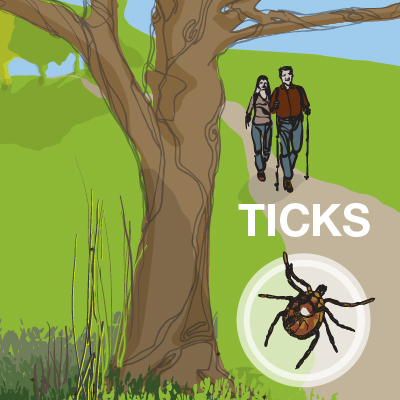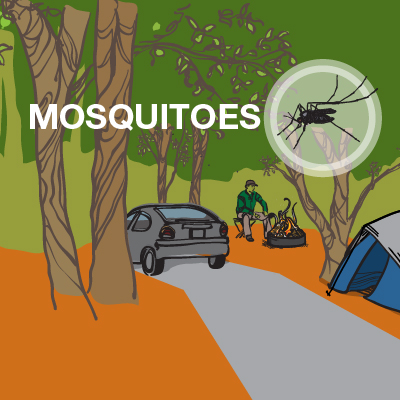at Missouri State Parks
Ticks

To make sure your visit to a Missouri state park or historic site is an enjoyable experience, you should know about ticks and ways to prevent problems associated with them.
Ticks are most often encountered in areas of tall grass and thick vegetation during the spring and summer months, but they also congregate in areas where animals frequent, such as animal-created paths in natural habitats. Ticks cling to your clothing when you walk through any type of vegetation. The likelihood of becoming sick is slim; however, several illnesses are linked to bacteria that can be transmitted by a tick.
Taking some simple precautions can help keep ticks off you and effectively deal with any ticks you find.
What precautions should I take?
-
Wear light-colored clothing so ticks can be seen easily.
-
Wear long pants tucked into boots or socks. Do not wear sandals or open-toe shoes when hiking in vegetation.
-
Apply insect repellent containing 20-50% DEET (as directed on the label) to your exposed skin and clothing.
- Stay on trails and away from areas of tall grass and vegetation. Walk in the center of trails to avoid overhanging brush and grass.
- Examine your clothes and skin frequently for ticks. Be sure to check your dogs too.
-
Shower soon after you return indoors.
- Do a complete body check after you have walked or hiked through any vegetation. Check your scalp carefully. The deer in its nymph stage (also called a seed tick) can easily be mistaken for a freckle or speck of dirt.
- If you find a tick attached to your body, carefully remove it immediately.
How do I remove a tick if I find one?
- Use tweezers to grasp the tick near its mouth parts (as close to your skin as possible). Pull firmly and straight out to remove the tick.
- Avoid squeezing the tick's abdomen. Crushing the tick could inject infectious fluids into your system.
- Use duct tape or other tape to remove seed ticks.
- If you must use your fingers, grasp the tick with a piece of tissue.
- Wash your hands and the site of the bite with soap and water. Apply antiseptic to the bite.
- Monitor the bite area for several weeks for any symptoms. If symptoms develop, seek immediate medical attention.
What symptoms should I watch for?
A tick-borne disease is often difficult to diagnose. The symptoms are very similar to those of other illnesses.
- In many cases, a rash or skin lesion will develop a short time after the bite. Sometimes there is redness near the affected area. Other common symptoms include fatigue, stiff neck and flu-like symptoms such as headache, chills, fever, sore throat, swollen lymph nodes and muscle aches.
- Untreated, these early signs may disappear, but other symptoms, such as heart problems and arthritis, may occur in the months or years that follow.
Antibiotics are effective in treating nearly all tick-borne diseases. The key is early detection and treatment.
For more information on ticks in Missouri, please visit the Department of Health and Senior Services website or contact your local health department. Click here for information from the Department of Health and Senior Services about avoiding diseases transmitted by ticks and mosquitoes.
Mosquitoes

Don't let them spoil your vacation! The recent concern about mosquito-borne diseases should not keep you from enjoying the outdoors. Less than 1% of mosquitoes carry the West Nile virus, and only 1% of people bitten by infected mosquitoes become ill.
What precautions should I take?
- Apply insect repellent to skin and clothing.
- Wear light or neutral-colored long-sleeved shirts and long pants when outside.
- Avoid areas of standing water that can be a breeding ground for mosquitoes.
- Avoid using perfumes or fragrances outdoors, as they are mosquito attractants.
- Limit outdoor activity between dusk and dawn when mosquitoes are most active.
Most people bitten by a mosquito with the West Nile virus experience no symptoms, but some become ill three to 15 days after being bitten. Symptoms range from fever, headache and body aches to confusion; convulsions; and, in rare cases, encephalitis, or swelling of the brain. Check with your doctor if you have any of these symptoms.
Click here for information from the Department of Health and Senior Services about avoiding diseases transmitted by ticks and mosquitoes.
What can I do at home?
- Don't let mosquitoes breed around your home.
- Eliminate standing water from flower pots, barrels, used tires, clogged roof gutters or water-holding containers.
- Install or repair window and door screens to keep mosquitoes out.
- Keep grass short so adult mosquitoes will not hide there.






